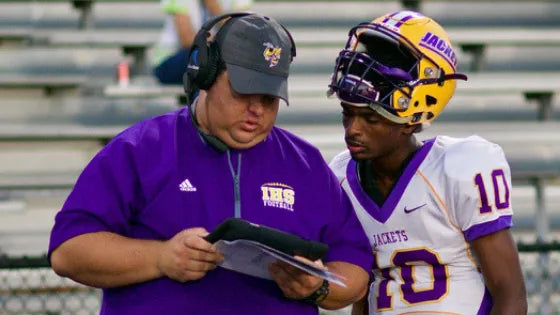The end of the regular season has arrived and while you may be fortunate enough to be headed into playoffs. That is not our current reality.
It was a long season. A hard season. A what-do-you-say-to-encourage-the-team, the coach, and even yourself season.
With a difficult season drawing to an end there is always a sense of relief, but along with that relief comes the constant replay of every practice, game, home-life interaction and the brain spiral of “what ifs.”
It isn’t easy to come against the enemy and self-doubt.
I am always comforted by the fact that we serve a creator who not only loves us when we clench a playoff slot, but also in our imperfection and self-doubt.
Deuteronomy 31:6 says, "Be strong and courageous. Do not fear or be in dread of them, for it is the LORD your God who goes with you. He will not leave you or forsake you.”
The old saying, “there is no 'I' in Team” is easy when you’re on the winning side. Giving the other players, the coaches, and the supportive fans the credit is the standard when you’re celebrating, but then why do we blame ourselves for the hard seasons and losses?
When times are hard and the losses are stacking up for the exhausted players, the frustrated coaches, and even the overburdened wives at home; the enemy starts to plant the, “What ifs?”
The player asks, What if I had practiced harder?, What if I'd caught that ball?, What if I were taller/faster?, What if I'd watched film longer?
The coach asks, What if I had pushed that kid harder?, What if I had given more to the team?, What if I'd called a different play?, and even the scariest thought of all, Is this my calling? and What if I’m not good enough?
The wife asks, What if I had attended more games?, What if I had said something more encouraging?, What if I had handled that issue at home on my own?
If you find yourself identifying with these thoughts, know that we are human and especially in sports we are taught accountability. But if holding ourselves accountable makes us lose perspective on the big picture, then we must refocus before the new season suddenly creeps up.
I have to remind myself:
There is no “I” in Team.
You were not the ruin of the season, that one mistake during practice or a game, that fight you had with your husband, that quarterback you chose to keep in—did not cost the season.
A football team is a family and in order for a family to be successful you have to keep those other people and their feelings in mind. When we make our families (and our football families) about ourselves, about “I,” we become less and less like Christ, who always puts us before him.
Philippians 2:4 says, "Let each of you look not only to his own interests, but also to the interests of others."
This acronym helped me keep this tough season in perspective:
T- ogether. We were together. Even on the tough days, your boys were bonding and doing what they love. Your coach was molding boys into men and doing what he loves. Your wife was taking the burden off her man, and when he came home (even though it was late and you were exhausted) you stayed up so y’all could be together.
E- very player, every day. Every player is important. This is not just on the football field. You dear wife, child, and of course coach are a vital part of this family. Without you the grueling seasons and long hours couldn’t be endured. Realizing the value in the each other’s company and support puts the hard times in perspective.
A-cceptance. Being able to accept the things we cannot change (hard if you’re a perfectionist like me) and not blaming one another, but learning and growing is what Christ calls us to do.
M-yself. This one has been the most challenging for me to accept. It is not about me. This crazy football life is not about any of us. If we focus on ourselves and make it about our strengths, then we are missing the Big Picture.
A football team is a family. If we as a family survived the season, encouraged each other, had a few laughs, and were together, then we were a TEAM.
I like to remember this phrase: "We were together. I forget the rest.”

